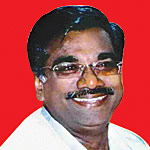A poser indeed. Better to frame the question differently: what is Life? Any way both questions are posers that would make any listener to quiver before he finds an answer. There can’t be one answer for everyone has an answer. And that does not solve the problem. Problem continues to remain a problem. No Alexander can cut this Gordian knot. It would be a futile venture.
Dr. Samuel Johnson once faced the poser. No gentleman would be a hypocritical poseur. But he didn’t hesitate even for a second. He confessed, “If you ask me I do not know. If you do not ask me I know.” As readers, if we read between the lines of the great champ of Literature, we can easily understand how powerfully he had used words to say that poetry is invisible and can only be felt like ‘wind’. Rather ‘breeze’ would be an apt word.
If poetry is feeling, then it should mean, poetry can be written only if the poet has a feel for his chosen subject, and the subject too has a feel for the poet. It is the subject matter that calls for a poet, a genuine one at that, inspires him and goads him to give shape to his thoughts on paper. This is where poetasters fail, and poets succeed and the ‘poem’ worthy the name is born.
“All is grist to the writer’s mill,” they say. May be true. But it all depends upon how fertile, how creative and how different he is from the run-of-the mill poets.
Once John Keats and Leigh Hunt were listening to a cricket (not the game but the screeching insect) while sitting by the fire. Hunt suggested that they should both immediately write a sonnet on the subject. They plunged headlong into their chosen work. While Hunt focused on describing the insects themselves, Keats did not limit himself in this way. He came out with that lovely sonnet titled “On the Grasshopper and cricket.”
“Ah! That’s perfect! Bravo Keats!” said Hunt, generously acknowledging him the winner. It is Keats’s attitude to poetry in spite of what the critics of Blackwood Magazine said of him that would bring laurels to the poet. “Why is poetry difficult these days?” T.S. Eliot of ‘The Wasteland’ fame was once asked such a question. He too without any hesitation replied, “that is because modern way of living is difficult”.
Agreed! Is not Literature the mirror of the Age? Difficulty comes when the reader has no time to decipher the lines in poetry. Reading between the lines paves way for the proper understanding of poetry. The result is untold joy indeed once the hidden meanings emerge to the surface.
Any great poet’s poems fulfil all the above mentioned criteria. The readers can feel the breeze these great poems fan. How creative, how fertile and how different he is, is every reader’s guess. At the same time it should be mentioned in passing his poems are difficult too, for he represents and Age that feels the difficulty in living.
It is this difficulty of living that gets expressed in great poems. No wonder that his choice words make hard nuts and it needs strength of mind and a proper understanding of the modern Age to crack these hardnuts. But some poets wantonly put lot of obscurity in their poems. Then they themselves forget the meaning. Like Robert Browning of the Victorian era tend to say, “When I wrote those particular lines, God and I knew the meaning. But now God only knows”. I for one believe in the words of Mahakavi Subramania Bharathi who defined poetry thus: “the illiterate too should understand and enjoy poetry once it is recited”.
A Sufi poet was once approached by budding poets of that locality. They wanted to learn the art of poetry writing and wanted the answer from the horse’s mouth. They badgered the poet for an answer. “How do I know?” retorted the Sufi poet, unable to reveal the poet’s art and craft. He wanted to evade their questions and make his great escape. But the budding poets were not ready to leave him at that. If they could not get an answer from the poet where else to approach? So they said, “You write readable poetry. We appreciate your words and the music that go along with it. That’s why we asked you. Please tell us how you write your poems? Don’t let us down”.
The Sufi poet scratched his bald pate, rubbed his forehead, thought a lot and minutes later said, “Poems are everywhere. They wander over our heads, under our very nose, in front of our eyes, sometimes rubbing shoulders with us… What I do is, I simply grab them and garb them and then allow them to move about once again.”
Great poets have done what the Sufi poet had confessed.























